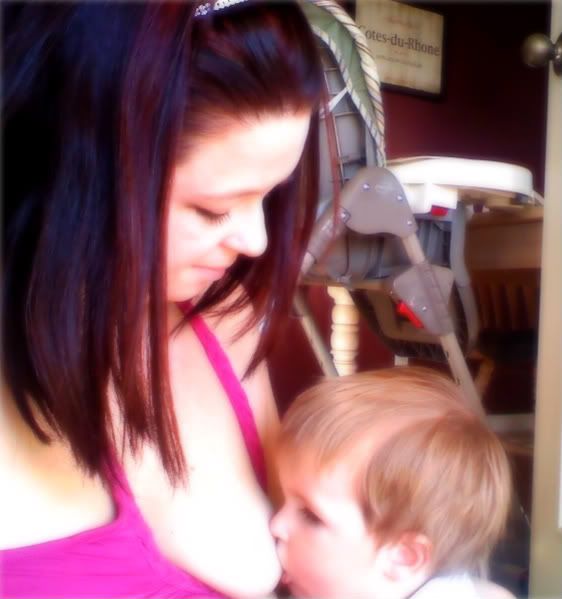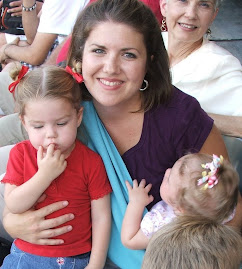I came across this article and was shocked. How freaking selfish can you be?
Many mothers today are made to feel guilty about bottle feeding their baby. The medical profession, the media, family, strangers in the street, all eulogize the benefits of breastfeeding. We're told; it's natural; it has just the right nutrients for your baby; it promotes better bonding between mother and child; it's environmentally friendly! All of these things are true to an extent but the plain fact is, many mothers do not breastfeed their child and many are made to feel like a pariah if they opt for the bottle. Promoting breastfeeding as being best is fine, but disparaging mothers who bottle feed is not.
If you are a mother who has chosen not to breastfeed, and who can't breastfeed, you must never, ever feel guilty about doing so. Today's baby milk formula is the closest it has ever been to breast milk. It also comes fortified with many nutrients that are low or absent in many mother's breast milk. Formula milk is fortified with iron and vitamin D. Fact: Iron-fortified infant formulas have actually been credited for the declining incidence of anemia in infants. For this reason, the American Academy of Pediatrics highly recommends that mothers who are not breastfeeding use an iron-fortified infant formula. So, as far as nutrition goes, a mother need have no worries about giving her baby milk formula.
Being a mother is very tiring. Infant formula milk is not as easily digested as mother's milk. Consequently, the baby feels satiated for longer periods and this extends the time between feedings at an earlier stage. So a mother who bottle feeds can get more rest between feeds than a mother who breastfeeds.
One major cause of concern for breastfeeding mothers is knowing whether or not her baby is getting enough milk. Not so with infant formula. A mother who bottle feeds her baby knows exactly how much she has fed her child and can rest easy knowing her child has received its recommended daily allowance.
A mother who bottle feeds her child can return to a more normal life than a mother who breastfeeds. A mother who bottle feeds can wear the clothes she wants; a nursing mother has to wear clothes to accommodate her hungry baby. A mother who bottle feeds can eat the diet she chooses and not have to worry about drinking alcohol; a breastfeeding mother's diet is a much duller affair. Bottle feeding mothers can take medication when the need to; a breastfeeding mother has to be very careful about any medication she takes as this will be passed on to baby through her breast milk, in fact some medication may even stop her milk production.
Lovemaking is sometimes not easy for the breastfeeding woman because the hormonal changes associated with lactation leaves her vagina dry. In addition, breastfeeding can lead to sore nipples and leaky breasts, which are not conducive to lovemaking. A bottle feeding mother should not have these problems. She also has the added benefit of being able to choose the contraception of her choice. A breastfeeding mother cannot take the oral pill as its hormones will be passed on to baby through her breast milk.
A mother who bottle feeds her child can begin to diet six weeks after delivery. A breastfeeding mother on the other hand, has to be careful about her diet.
Bottle feeding in public tends to be far less embarrassing for a mother than does breastfeeding. A consequence is that many mothers who choose to bottle feed generally venture outdoors much more than those who breastfeeding; society has not made public breastfeeding easy for mothers.
So, next time you may feel as though you're letting yourself and baby down, remember that they are many advantages to giving your baby infant formula, for both mother and child.
A friend of mine said the following:
I find these types of articles quite comical. Majority, if not all of the benefits, are for the mother. You don't have to feel guilty if you bottle feed, but seriously, there are no benefits to bottle feeding for the baby OVER breastfeeding. Here's my response to every point she makes.
Today's baby milk formula is the closest it has ever been to breast milk.
And so it was 30 years ago, and 20 years ago, and 10 years ago, and will be 10 years from now. They’re always as close as they can get for the time that we’re in, but that doesn’t mean they’re really close. We also don’t even know all of what’s in breastmilk so it’s hard to compare.
It also comes fortified with many nutrients that are low or absent in many mother's breast milk.
Fortified is another way of saying unnaturally added vitamins. Also, the reason that breast milk lacks these “fortified vitamins” are because we’re trying to grow human babies slowly, not cows. Human babies don’t need as much iron as cows, and humans can’t absorb as much iron from cows either.
Infant formula milk is not as easily digested as mother's milk. Consequently, the baby feels satiated for longer periods and this extends the time between feedings at an earlier stage. So a mother who bottle feeds can get more rest between feeds than a mother who breastfeeds.
The baby is having a harder time digesting and this is a benefit? Wow. This is only a benefit to a mother’s sleep, which the mother will get in time and with a proper sleep routine. If you want sleep that bad, don’t have a baby. BTW, nursing gives the mother a time out so she has no choice but to rest. :)
A mother who bottle feeds her baby knows exactly how much she has fed her child and can rest easy knowing her child has received its recommended daily allowance.
Even better, when you don’t bottle feed you don’t have to worry at all about how much your baby is getting because as soon as they pop off and don’t want the boob anymore you can say they are done, no measuring required. Wet diapers and weight gains are ways of knowing your baby is eating enough. BTW, if you can’t measure how much breastmilk a baby is getting, where did the recommended daily allowance come from then?
A mother who bottle feeds her child can return to a more normal life than a mother who breastfeeds.
Normal? So I can live like I don’t have a kid anymore? Awesome. Er… what is normal anyways? If we are talking about a normal body, then breastfeeding will actually help you lose weight much faster and ease your hormones rather than if you were to formula feed.
A mother who bottle feeds can wear the clothes she wants; a nursing mother has to wear clothes to accommodate her hungry baby.
I can find a way to feed my baby in anything I wear. I can find a way to pop a boob out for the babe.
A mother who bottle feeds can eat the diet she chooses and not have to worry about drinking alcohol; a breastfeeding mother's diet is a much duller affair.
We all know that when you’re a mother you’re up at 10 AM with a full bottle of wine. I mean really, who can drink a lot while your child is awake anyways? If you need that much alcohol, you have a problem. Otherwise just drink after your child has just finished nursing, it’s not hard.And I can eat pretty much anything I want!
Bottle feeding mothers can take medication when they need to; a breastfeeding mother has to be very careful about any medication she takes as this will be passed on to baby through her breast milk, in fact some medication may even stop her milk production.
This is true. If you have a serious disease/illness/problem where you can’t stop your medication, then don’t, and choose not to breastfeed. Likely you can breastfeed on this medication anyways. Mothers milk with medication in it still far surpasses artifical milk
Lovemaking is sometimes not easy for the breastfeeding woman because the hormonal changes associated with lactation leaves her vagina dry. In addition, breastfeeding can lead to sore nipples and leaky breasts, which are not conducive to lovemaking.
Use lube if you’re dry, duh. Sore nipples will either heal over a short time or your latch was/is not correct, try to fix it early. Leaky breasts only last up to 2 months, until you stop leaking they make nursing pads, use those. Lovemaking… who the hell wants to have sex when you have a baby anyways? Also, your husband should not care about you leaking. Find a new husband if he is bothered by it. I personally have no dry problems.
A breastfeeding mother cannot take the oral pill as its hormones will be passed on to baby through her breast milk.
A breastfeeding mother can use the mini pill if that’s her choice. A mother can also take a normal pill. The hormones passing to the baby are not the issue. There are condoms which are hormone free and probably better for you anyways. There’s IUDs, diaphragms, and uhh just knowing when you’re fertile and avoiding. Even better though, breastfeeding hormones usually prevent you from getting your period for about 6 months or more. This is your body’s way of keeping you from having another baby too soon, naturally.
A mother who bottle feeds her child can begin to diet six weeks after delivery. A breastfeeding mother on the other hand, has to be careful about her diet
A fad diet to which you can’t have while you breastfeed is probably not good for the mother as well. There are times when you have to cut dairy or certain veggies out too, but there are plenty of other foods you can eat, choose one of those. But the great thing about breastfeeding is that nursing helps you burn calories so you don't have to "diet."
Bottle feeding in public tends to be far less embarrassing for a mother than does breastfeeding. A consequence is that many mothers who choose to bottle feed generally venture outdoors much more than those who breastfeeding; society has not made public breastfeeding easy for mothers
Actually I think breastfeeding is far less embarrassing. I’m proud to have breastfed, why would I not want to show people what I’ve accomplished? And the fact that the public doesn’t make it easy for mothers is a problem that society needs to get over, but the mother, she’s done nothing wrong.






